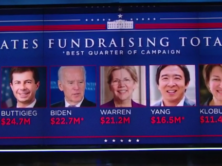
Christopher Pellot of Washington Heights. June 24, 2012 Gay Pride Parade, in New York City .(Credit: London Shearer Allen)
As described in an earlier report on this website, a new iMediaEthics poll found about 7 in 10 Americans tolerant of gay marriage – that is, they would not be upset if most or all states recognized such marriages as legal, with all the same rights as traditional marriages.
Other polls have also shown a widespread tolerance of gay marriage, though it’s difficult to find much discussion about that because of the way most questions are worded.
For example, in two recent polls, both Pew and NBC/Wall Street Journal did apply a measure of intensity, in order to differentiate people who held their beliefs strongly and those who didn’t. Pew did this by asking: “Do you strongly favor, favor, oppose, or strongly oppose allowing gay and lesbian couples to marry legally?” The implication is that if one doesn’t “strongly” favor or oppose the issue, respondents will choose answer just the simple “favor/oppose” option.
The NBC/WSJ poll obtained its intensity measure by asking two questions: first, the forced choice question (“Do you favor or oppose allowing gay and lesbian couples to enter into same-sex marriage?”); then, a follow-up to respondents choosing one side or the other: “Would you say you strongly favor/oppose, or just somewhat favor/oppose?”
In the table below are the results from the Pew and NBC/WSJ polls, compared with the results from the iMediaEthics poll – which asked half its sample the typical forced-choice question, and the other half a question which allowed respondents to indicate the issue didn’t matter to them.
As all these results make clear, large percentages of Americans do not have strong opinions on this issue. If explicitly asked whether the issue matters to them or not (as iMediaEthics did in one-half its sample), 23% admit it doesn’t, and another 4% volunteer they have no opinion. The forced-choice questions (by one-half the sample in iMediaEthics and the questions by Pew and NBC/WSJ) elicit much smaller (volunteered) expressions of no opinion – from 6% to 11%.
Nevertheless, when respondents are asked to express how intensely they hold their views, it becomes clear that all these polls find that a large plurality of Americans do not hold strong opinions on the issue. This conclusion is evident when the results are graphed, as shown below.
One reason it’s difficult to find this kind of information from media polls is that though they may mention the intensity measures, the pollsters don’t know how to interpret what they mean. What does “strongly” vs. “somewhat strongly” actually indicate?
The iMediaEthics poll asked a question, which – on its surface – seems to give some insight into what people are thinking. It asks if people would be “upset” if the opposite happened to what they had just said. As it turns out, a substantial number of people who had just said they opposed gay marriage, then admitted they wouldn’t be upset if in fact states were to recognize gay marriage as legal. Similarly, many people who said they favored gay marriage admitted they were not upset that most states did not recognize it as legal.
When people say they are “not upset” if the opposite happens to what they’ve just said they preferred, it seems reasonable to infer that those people don’t really mind which way the issue plays out.
The question of how best to measure public opinion becomes important when we are looking at an issue like same-sex marriage. Polls suggest a highly polarized country with opinions that are almost evenly divided on one side or the other. But, in fact, this analysis shows a much more laid-back citizenry, with anywhere from 22% to 32% of Americans intensely opposed to gay marriage, and with the rest of the country – from about two-thirds to more than three-quarters – either not concerned about the issue, or intensely in favor.
What Do People Want Their Public Leaders to Listen To?
An underlying assumption of a democratic government like ours is that if people don’t like what their public leaders are doing, they will vote against them. One measure of the importance of an issue, therefore, is whether people are more inclined to support or oppose a candidate for office, based on what that candidate’s position is on the issue.
In its recent same-sex marriage poll, NBC/WSJ asked: “Would you say you are more likely to vote for a candidate who supports same-sex marriage, a candidate who opposes same-sex marriage, or would it not make much difference in how you might vote?”
The results are shown in the graph below:
.JPG)
A clear majority, 54%, said the issue wouldn’t make any difference who they voted for (and an addition 1% were unsure), while 25% said they would vote for a candidate who supported gay marriage, and 20% said they would vote for a candidate who voted against it.
There are, of course, many other measures to assess the importance of issues to citizens. But all the measures here – whether asking if people would be upset if their view doesn’t prevail, or whether they feel strongly or not about the issue, or whether they would hold their elected representatives accountable by voting for (or against) political candidates based on this issue – reinforce the conclusion: Gay marriage is at least tolerated by a large majority of Americans.








Comments Terms and Conditions